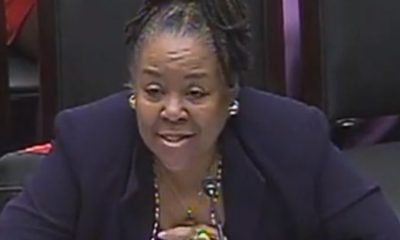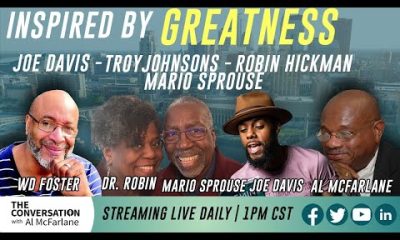#NNPA BlackPress
FILM REVIEW: New Wave of Black Films Crests at 2019 Toronto International Film Festival
NNPA NEWSWIRE — Black artists, filmmakers and films were a key part of the mix at the 2019 Toronto Film Festival. Big budget movies, small indie films, documentaries and shorts filled out the innovative programming. Check out the best of the best and the most noteworthy.
By Dwight Brown NNPA News Wire Film Critic
Nearly 500,000 film lovers flocked to the 2019 Toronto International Film Festival, screening hundreds of films from all over the world. Artistry and diversity, the hallmarks of TIFF, were on view.
Black artists, filmmakers and films were a key part of the mix. Big budget movies, small indie films, documentaries and shorts filled out the innovative programming. Check out the best of the best and the most noteworthy.
BLACK FILMS & BLACK FILMMAKERS
Atlantics (***)
An ill-fated romance in Senegal takes center stage in this visually stunning ode to passion and yearning. French actress-turned-filmmaker Mati Diop won the Cannes’ Grand Prix for co-writing this love triangle between a young woman (Mama Sané), an out-of-work construction worker (Ibrahima Traoré) she loves, and a wealthy fiancé (Babacar Sylla) she disdains. With Claire Mathon behind the camera, Dakar looks picturesque and the composition of each scene is as perfect as the lighting. Diop tells her story using lots of imagery and long scenes that test patience. The beautiful cast looks like they stepped out of Essence Magazine. Themes of class divide, spirits from beyond and girlfriends who like to party often crowd what could have been a simple love story. Still, the romance in this film prevails.
Clemency (***).
The debate over the death penalty gets a new spark with this very personal look at a humanistic warden (Alfre Woodard) who makes end-of-life experiences as compassionate as possible for those on death row. It’s as if Warden Bernadine Williams goes on cruise-control as she and her staff strap in inmates for that lethal injection. She thinks she’s fully prepared for everything. Then there’s an inevitable catastrophe that magnifies the toll her job takes on her psyche and husband (Wendell Pierce) and sobriety. Writer/director Chinonye Chukwu’s message is that executing criminals is inhumane. Slow steady drama builds and builds. Woodard creates a protagonist who is equally likeable and unapproachable. Her steely performance is complemented by supporting cast members: Aldis Hodge as the cop-killer next in line for death; Richard Schiff as the convict’s hopeful lawyer; Danielle Brooks as a person from the prisoner’s past.
Dolemite Is My Name (****)
When you need encouragement, comedian Rudy Ray Moore (Eddie Murphy) commands, “Put your weight on it.” It’s a mantra he takes to heart as he shifts his talent from struggling comic and spoken-word pioneer to novice DIY indie filmmaker. Moore’s alter-ego is Dolemite, a feisty, martial-arts-loving character he pushes to the front of his first movie. Under the guidance of director Craig Brewer (Hustle & Flow), with a hilarious bio/script by Scott Alexander and Larry Karaszewski, Eddie Murphy makes a splashing film comeback as the outrageously bold and determined artist who became an integral part of the 1970s Blaxploitation era. Never one to take no for an answer, the brash Moore gives Murphy a great opportunity to work his comic genius. And he does, along with a hilarious dream team who milks laughs: Keegan-Michael Key, Craig Robinson, Tituss Burgess, Wesley Snipes, Mike Epps, and the shameless scene stealer Luenell (I Got the Hook Up 2). Add in cameos by T.I. and Snoop Dogg and a plotline that leads to euphoria and this bit of hilarity becomes an amazing crowd-pleaser and an inspiring movie.
Harriet (***)
The responsibility for getting Harriet Tubman’s legacy as an abolitionist and the history of the Underground Railroad told right is a weight few filmmakers could carry. Director Kasi Lemmons (Eve’s Bayou) is up to the task and has a vision. Her efforts are helped by Terence Blanchard’s emotionally charged musical score, John Toll’s evocative cinematography (he makes everyone’s complexion incandescent) and Paul Tazewell’s costumes. The script, by Lemmons and Gregory Allen Howard, pulls the characters into one epic tale of inhumanity, humanity and legendary acts of bravery. Cynthia Erivo (Tony winner The Color Purple; film Widows) plays “Minty” (Tubman’s nickname) with conviction. The evildoers (Joe Alwyn, Jennifer Nettles) and saviors (Leslie Odom Jr., Janelle Monáe) are perfectly portrayed. Lemmons can be heavy on the flashbacks (black and white clips of a family breakup seem redundant), and the footage looks like a cross between an art/indie film and a Lifetime network movie. But overall, she has accomplished a difficult mission that brings the life of an extraordinary liberator into full view. Finally the film medium has produced a public record of Harriet Tubman’s heroism. Now it’s time for Tubman’s image to be on the $20 bill.
Just Mercy (***)
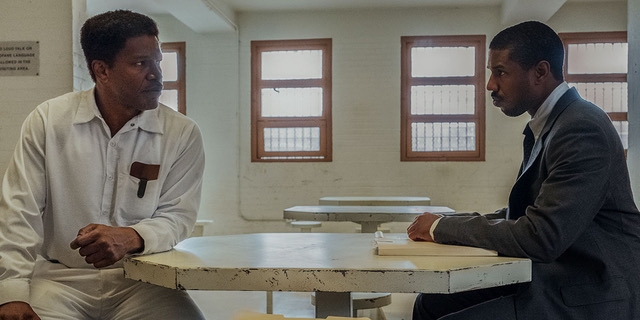
Jamie Foxx and MIchael B. Jordan in Just Mercy
A young Harvard educated lawyer, Bryan Stevenson (Michael B. Jordan), could have his pick of law firms, instead he heads to rural Alabama to set up a small law practice that seeks to reverse death row sentences for wrongfully convicted prisoners. There are many in need, but one of his primary clients is Walter McMillian (Jamie Foxx), who was convicted of killing a white woman. The film is set in 1989 and stars Jordan, but if you close your eyes and imagine a young Sidney Poitier in the lead role, you’ll get a feel for the tone of this well-intentioned but typical crime drama. Director Destin Daniel Cretton’s approach to the genre is formulaic, but gets the job done. Cretton and co-writer Andrew Lanham use the real lawyer Stevenson’s award-winning non-fiction book Just Mercy: A Story of Justice and Redemption as source material to depict poor black men being railroaded into death sentences in the south—well into the late ‘80s. Foxx gives his best performance since Ray. Jordan breaks out of his normal hero-ish mold to play a goodwill attorney, and that’s refreshing. Supporting cast of Brie Larson, Rob Morgan, Tim Blake Nelson, Rafe Spall, O’Shea Jackson Jr., and Karan Kendrick are particularly interesting to watch. A very northern and stiff lawyer learns how to acclimate to a friendlier rural southern black community and it’s a startling juxtaposition that adds depth to the proceedings
Waves (**1/2)

The Cast of Waves
Filmmaker Trey Edward Shults made an impressive directorial debut with the ultra-realistic family drama Krisha. This return to familial themes focuses on a wealthy black household. A dad (Sterling K. Brown) and stepmom (Renée Elise Goldsberry)—helicopter parents—pressure their teenage son (Kelvin Harrison Jr, Assassination Nation), a high-school wrestling champion, to succeed. He, however, is clandestinely living large, beset with injuries and having major girlfriend problems. His younger sister (Taylor Russel) waits in the wings for the attention she deserves. Shults’ script and direction jump-start start this teen saga with a kinetic verve reminiscent of filmmaker Harmony Korine’s wild and debauched Spring Breakers. Quick, flashy MTV-like edits (editors Isaac Hagy and Shults), a heavy-bass musical score (Trent Reznor and Atticus Ross) and an envious playlist of hip artists set the tone. The look of the film is perfect: production design by Elliott Hostetter; set decoration by Adam Willis; cinematography by Drew Daniels; and costume design by Rachel Dainer-Best. The plotline in Acts I and II leads to a clichéd stereotypical interpretation of a young black man’s life, which would be suspect coming from a black filmmaker, and is almost insulting coming from a white one. Act III takes the film in a completely different direction, which is fraught with heavy emotion that doesn’t always ring true. Something like TV’s overly touchy-feely This Is Us. In fact, watching Sterling K. Brown shed tears on screen, like he does incessantly on the TV show, is like watching a rainstorm on a tropical island. It’s an event, but it’s no surprise.
BLACK ARTISTS IN FILMS
The Goldfinch (*1/2) The novel of the same name by author Donna Tartt won the 2014 Pulitzer Prize for Fiction. This weakly developed screen adaptation will likely win a Razzie. Can’t blame the premise: A kid, Theo (Oakes Fegley), and his mom enter the Metropolitan Museum of Art. A bomb ignites. She dies. He is taken in by a friend’s wealthy mother (Nicole Kidman). Theo’s worthless father (Luke Wilson) wrestles him away, eyeing the kid’s money. A missing painting of a goldfinch—worth millions—is lost in the explosion. Who has it? Years later Theo (Ansel Elgort) can’t shake his tragic past. Director John Crowley endeared himself to audiences with his sweet, simple period film Brooklyn. In this muddled and overly complicated interpretation of the book (Peter Straughan screenwriter), a series of preposterous circumstances and an overabundance of characters stymies any plausibility. Fegley’s performance fails to make a lasting impression. The photogenic Elgort is handcuffed by a poorly written character. Veteran actor Jeffrey Wright gives the only spot-on performance, but even he can’t save a silly storyline from itself. And why cast a Canadian actor (Finn Wolfhard) and a Welsh actor (Aneurin Barnard) in a pivotal role as Theo’s “Russian” friend Boris (young and old) if they can’t master the accent? Tech credits are solid. Little else is.
Honey Boy (**) His public meltdowns were documented in the news. And now, it’s as if actor/writer Shia LaBeouf wants the masses to know that his erratic behavior is the result of an irregular childhood. Otis (Noah Jupe as the 12-year-old; Lucas Hedges at the 22-year-old), is a child actor being bullied by his ill-tempered father (LaBeouf). Life ain’t easy. Though first-time feature filmmaker Alma Ha’rel directs what’s on the page pretty well, the story, lead characters and their conflicts never gel. LaBeouf lays the bad dad persona on thick, making him appear cartoonish. Bryon Bowers (TV’s “The Chi)” plays an AA friend. Musical artist FKA Twigs portrays a neighbor in a rundown motel. Cast also includes veteran actors Clifton Collins Jr. and Laura San Giacomo. Well-intentioned project. Iffy results at best.
Hustlers (***) A group of industrious strippers bilk Wall Street men out of thousands of dollars during the money-raining days leading up to the great recession. Writer/director Lorene Scafaria (The Meddler) bases her script on a New York Magazine article that chronicles the con games run by Samantha Barbash, a scheming hostess at New York’s strip club Scores. The women swipe credit cards, charge up clothes, buy houses and set up an enterprise that is quite profitable. Sets (production design by Jane Musky), costumes (Mitchell Travers) and cinematography (Todd Banhazi) provide plenty of eye-candy. The pacing (editor Kayla Emter) is tight too. Your eyeballs will pop out of your head when 50-year-old J. Lo, as ringleader Ramona, shimmies down a stripper pole displaying the abs of a twentysomething. As she leads her robber posse on an excursion filled with peril, joy, riches and life lessons, you will be thoroughly entertained. Constance Wu, Mette Towley, Keke Palmer, Lili Reinhart and a cameo by ex-stripper Cardi B add magic as the women go from self-help, to self-employment, to self-infliction. Enjoy, and don’t forget to tip!
Knives Out (**) Who did it in this whodunit? And, who cares? Writer/director Rian Johnson (Star Wars: The Last Jedi) tries his hand at mystery writing, to little avail, and he must be an ardent Agatha Christee (Murder on the Orient Express) fan. A wealthy, elderly novelist (Christopher Plummer) dies. Suicide? Homicide? A southern sleuth (Daniel Craig) investigates. Johnson’s script is dull until the reading of the will, when family members’ greed and rivalries rage. The ensemble cast is impressive: Chris Evans, Ana de Armas, Jamie Lee Curtis, Michael Shannon, Don Johnson, Toni Collette and Lakeith Stanfield as Lieutenant Elliott. There are plot twists aplenty, but none add up to much. Craig’s Alabama accent is atrocious. Does Johnson get anything right? The novelist’s grandson (Evans) drives a sleek 1960/70s silver BMW that is a work of art.
The Report (****) Tracking down the truth regarding the CIA’s Detention and Interrogation Program and the department’s use of torture is a sobering task for Senate staffer Daniel J. Jones, (Adam Driver). Yet, under the guidance of his boss Senator Dianne Feinstein (Annette Bening), he perseveres. Years of Jones’ research unearth wrongdoing, cover-ups and lies that may never come to light. Writer/director Scott Z. Burns (The Informant!) slowly turns a very wonky, fact-based political story into a thrilling drama that pits reality against deceit and the Senate versus the United States Intelligence Community. It’s a battle of wills. Driver’s very intense performances holds viewer’s attention as a barrage of facts, figures and names rain on them in a way that only CNN could decipher. What will stay with audiences forever is that a few people fought to have the CIA’s machinations exposed. An exceptional cast also includes: Jon Hamm, Corey Stoll, Evander Duck Jr., Maura Tierney and Linda Powell (House of Cards).
Uncut Gems (****) “They say you can see the whole universe in an opal.” That makes perfect sense to Howard Ratner (Adam Sandler), a gregarious, Jewish NYC jeweler who is deep in debt to the wrong kind of people and hoping his next scheme will get him out of trouble. This time, his plan includes selling a massive opal—the size of a baseball. Brothers Benny and Josh Safdie (Good Time), New York City-based writer/directors, have an urban, guerilla style of filmmaking that mirrors Martin Scorsese’s early works. Now, with a big budget in hand, they get to use all the crayons in the box. Sandler strips away his sunny facade and plays an addicted gambler who chums it up with hip black clients (basketball player Kevin Garnett), holds it down at home with his wife (Idina Menzel), and juggles a hush-hush life with a secret lover (Julia Fox). Player! The film aptly captures the mayhem and noisy din of the Diamond District. Rarely do movies chronicle any synergy between Blacks and Jews who are both living on the same edge. Brilliant filmmaking. Sandler deserves an Oscar nod and an apology from past naysayers. Every dog has its day
OTHER FILMS OF NOTE
A Beautiful Day in the Neighborhood (**1/2)
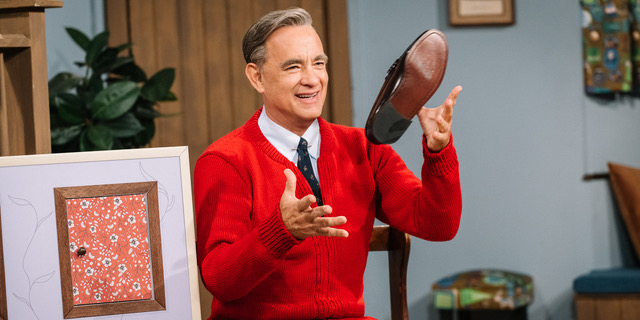
Tom Hanks stars as Mister Rogers in TriStar Pictures’ A BEAUTIFUL DAY IN THE NEIGHBORHOOD. Photo by: Lacey Terrell
Mr. Rogers was loved. Like that uncle who came over for Christmas every year and brought the best presents. Ones you didn’t know you needed ‘til you had them. If you’re expecting a charming biofilm, don’t. If you want to witness how one kind person can positively affect other people’s lives, welcome. The script by Micah Fitzerman-Blue and Noah Harpster takes its cue from a true-life story about an emotionally tarnished Esquire journalist assigned to interview Rogers. IInstead, he becomes the recipient of the cardigan-wearing TV host’s healing powers. Director Marielle Heller (Can You Ever Forgive Me?) sensitively guides the cast through this loving fable. Tom Hanks, Matthew Rhys, Chris Cooper and Wendy Makkena (TV’s Judging Amy) handle their duties well. It’s easy to get caught up in the journalist’s redemption. Not all audiences will be thrilled that they’re getting a “life-coach” movie for the holiday season (release date 11/22/19), instead of the real skinny about the TV icon’s personal life. Some may say, “Where’s the beef?”
Bad Education (****)
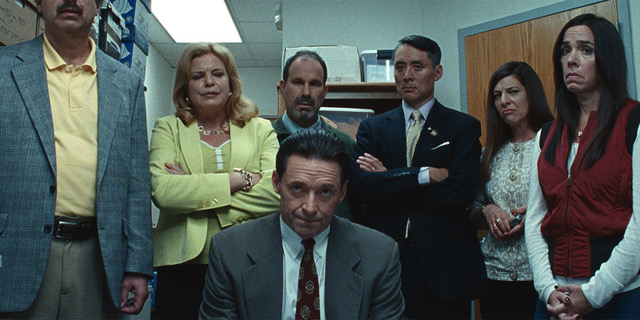
Hugh Jackman in Bad Education
Thou shalt not steal. It’s a commandment that the characters in this true-life tale of debauchery and excess don’t heed. All is going well in Long Island’s Roslyn School District, until a high school newspaper journalist (Geraldine Viswanathan) starts investigating line items on the school district budget that seem, well, fake. Contractors and companies are ghosts. Certainly Pam Gluckin (Allison Janney), who handles the budgets doesn’t see anything wrong. Nor does the easy-going school district superintendent (Hugh Jackman). As the undeterred student continues to dig, the improprieties mount. The plotline (screenwriter Mike Makowsky) unravels in bits and pieces, causing increasing astonishment. Jackman is as wicked as he can be. Janney as the lady with more relatives on the payroll than Trumps in the White House, plays her sociopathic character to a T. Director Cory Finley (Thoroughbreds) doesn’t point fingers, doesn’t pass judgement. Instead he weaves extramarital affairs, weak school boards and betrayals into a web of insanity that is as outrageous as Janney’s other mayhem vehicle, “I, Tonya.” What’s the alternate spelling of embezzlement? P-R-I-S-O-N. A total delight in the most devious way.
Blackbird (***) People deal with their last moments on earth in their own ways. Few, however, decide to throw a weekend party so family members can watch them commit suicide. That’s the premise of director Roger Michell’s (Notting Hill, My Cousin Rachel) warmhearted look at a clan who wrestles with cancer, mortality and conflict. Christian Torpe’s screenplay creates viable characters and sets their actions and reactions in motion. Mom (Susan Sarandon) is the weed-smoking matriarch, dad (Sam Neill) her life partner. Two daughters (Kate Winslet, Mia Wasikowaska) show up with their extended families along with mom’s best friend Liz (Lindsay Duncan). Jealousies, rivalries and inner turmoil brim to the surface as they confront mortality: ‘You’re here now. But tomorrow you’ll be dead,” says one daughter. Some moviegoers may wish the family was more down to earth blue-collar than whiny and rich. The wonderful ensemble acting comes under the guidance of Michell. Poignant life-affirming words by Torpe’s perceptive script endure: “The day’s go by so slowly. The years go by so fast.” Considering the gravity of the subject matter, what’s on view is surprisingly touching and disarming in the best ways.
Coming Home Again (***) The bond between a mother and her son is tested in this warm-hearted story about a young Korean American man (Justin Chon, Gook) who leaves his job and girlfriend behind to take care of his terminally ill mom (Jackie Chung, Grey’s Anatomy) in San Francisco. They connect through food and the recipes she passes on to him. Based on his own experience, director/writer Wayne Wang (Joy Luck Club) creates a very humbling and humanizing story in a low-budget, small-cast movie that is powerful. Chon’s sensitive acting plays well against Chung’s spirited portrayal. Their experience and culture are specifically Asian, but the lifecycle event is universal. Wayne’s illuminating script and restrained direction give a sense of authenticity and clarity to everything. When the camera focuses on Chon trying to putty up a crack in an old wall, it becomes a metaphor for the film’s very rich and gripping premise.
A Hidden Life (****) In this age of neo-fascism, writer/director Terence Malick (Days of Heaven) astutely reminds viewers that they can counteract evil in their own way. Austrian farmer Franz Jägerstätter (August Diehl) becomes a conscientious objector during World War II. His neighbors and town officials in his small village ostracize him, his wife Franziska (Valeri Pachner) and their three young daughters. The Nazis have a plan for him, and its bleak. Malick sets the location perfectly with wondrous shots of the Alps. Scenes of Hitler’s brutal officers committing atrocities reflect the era. The music (James Newton Howard), cinematography (Jôrg Widmer) and production design (Sebastian T. Krawinkel) are exquisite. Eerie parallels to modern times, echo again and again, as vicious leaders pray on the weak and instill fear in the masses. Franz to his spouse: “Oh my wife. What happened to our country, the land we love?” He adds: “If God gives us free will, we’re responsible for what we do.” A masterpiece of storytelling becomes a fitting tribute to those who remain principled and defiant.
Joker (**1/2) Why would a film company give a stand-alone origin project about the comic book villain The Joker to the writer/director of The Hangover series, Todd Phillips? Casting Joaquin Phoenix in the lead role, whose acting is ingeniously mercurial in the villain, is brilliant. Phillips? That’s a question mark. Arthur Fleck (Phoenix), a rent-a-clown loser who lives with his mom, is tormented by a defect that makes him laugh inappropriately and uncontrollably and is bullied by adults—and kids too. It’s no wonder the dude is angry at the world. Phoenix creates a snake of a man with few to no redeeming qualities and along the way he turns in a blistering performance that should get him a front row seat on Oscar night. Strong visuals and imaginative action scenes are absent in this crime thriller. Blame director of photography Lawrence Sher (Hangover) for the lapse in striking images. And Phillips gets no love for a dearth of cool fights and heated battles.
Judy (***1/2) No feature film could capture the entire troubled life of Judy Garland, who went from child actress (The Wizard of Oz), to deceased drug and alcohol-impaired adult in just 47-years. Smartly, director Rupert Goold and screenwriter Tom Edge pull from the stage play End of the Rainbow by Peter Quilter, which recounts the last six months of the star’s increasingly unsteady life. Credit Renée Zellweger for doing her own singing. Does she sound like Garland? No. Does she evoke her spirit? Yes—like a champ! The director, writer and actress make Garland look sociable, self-involved and weary of her superstardom all at once. Judy, knowing the burden she can be on others during her drunken episodes, proudly proclaims to her elementary-school-age son, “It’s wonderful to have a son big enough to carry his mother to the car.” The film’s only questionable element is a parallel storyline about her childhood, when she was groomed to be a pill-popper and emotionally abused by adults. Dramatic scenes, where she argues with an ex-husband at lunch or comes out drunk on stage, will make you wince. This is a solid interpretation of a life everyone knew would be cut short, while garnering millions of fans along the way. Very sweet. Quite tragic. Garland: “I still believe in it. The love you have with an audience.”
Marriage Story (****) As writer/director Noah Baumbach has matured, so has the subject of his films. His 1995 movie Kicking and Screaming reflected his 26-year-old view of life. His 2019 film Marriage Story captures the angst of a 50-year-old who has weathered a divorce. He doesn’t have to say that this story is coming from a very organic place. It’s obvious by the characters on view and the raw emotion they display. Charlie (Adam Driver in his best performance ever) is the head of a Brooklyn theater group. Nicole (Scarlett Johansson) is his wife and the troupe’s star. She’s offered a TV pilot in L.A., and that decision leads the two and their son Henry (Azhy Robertson) on a twisted road through divorce land, which turns them into adversaries with lawyers (Laura Dern for her; Ray Liotta for him.) who bully. There are screaming matches in this marital breakup parable that are as primal as the ones in Who’s Afraid of Virginia Woolf?” In 136 engaging minutes Baumbach relives every tortured moment and slight in the couple’s less than idyllic marriage. D-I-V-O-R-C-E!
The Personal History of David Copperfield (**1/2) No this is not about the magician. Think back further to 1850 and a book written by Charles Dickens: David (Dev Patel), is raised by his widowed mother and a loving housekeeper. Life changes when mom marries a wicked man. Soon after, the boy is kicked out of his house, into boarding schools, factory work and eventually to the loving home of his eccentric Aunt Betsey (Tilda Swinton). David’s refuge is his writing. Director Armando Iannucci (The Death of Stalin) uses Simon Blackwell’s script to form a storybook life that is as winsome and charming as it is boring and too British. Think British director Mike Leigh and his obscure movie Topsy Turvy, and you get the gist. Oscar nominee Patel is as magnetic as Swinton is eccentric. Iannucci’s decision to make 19th century London multicultural is very progressive. Rosalind Eleazar plays David’s love interest, and she and Patel are quite disarming in a film with little appeal other than its acting and tech credits.
The Two Popes (****) It’s surprising to watch a film about two heads of the Catholic Church, who have vehement disagreements and opposing viewpoints yet find common ground. It’s as if Anthony McCarten’s (Darkest Hour) insightful screenplay is trying to teach polarized factions how to bond. Anthony Hopkins plays Pope Benedict, the traditionalist monsignor who is stodgy and not hip to the times. Jonathan Pryce is Pope Francis, a sociable, humble innovator more concerned with the good of the people than the strict rules of the church. The film is strongest when the two actors are center stage giving their diametrically opposed opinions. It’s less interesting, but still good, when it depicts Francis’ backstory. Directed deftly by the brilliant Brazilian filmmaker Fernando Meirelles (City of God), the dignity, humanity and humor of the two characters is quite appealing. Francis: “How does an Argentinian kill himself? He climbs to the top of his ego and jumps off.” Jump Popes. Jump.
These movies and artists, fresh from Toronto, will be on a screen near you before you know it.
Visit NNPA News Wire Film Critic Dwight Brown at DwightBrownInk.com.
#NNPA BlackPress
IN MEMORIAM: Ramona Edelin, Influential Activist and Education Advocate, Dies at 78
NNPA NEWSWIRE — Born on September 4, 1945, in Los Angeles, California, activist Ramona Edelin’s early years were marked by a commitment to education and social justice. According to her HistoryMakers biography, after graduating from Fisk University with a Bachelor’s degree in 1967, she pursued further studies at the University of East Anglia in England. She earned her master’s degree before completing her Ph.D. at Boston University in 1981.
The post IN MEMORIAM: Ramona Edelin, Influential Activist and Education Advocate, Dies at 78 first appeared on BlackPressUSA.

By Stacy M. Brown, NNPA Newswire Senior National Correspondent
@StacyBrownMedia
Once upon a time, Black Americans were simply known as colored people, or Negroes. That is until Ramona Edelin came along. The activist, renowned for her pivotal roles in advancing civil rights, education reform, and community empowerment, died at her D.C. residence last month at the age of 78. Her death, finally confirmed this week by Barnaby Towns, a communications strategist who collaborated with Dr. Edelin, was attributed to cancer.
Born on September 4, 1945, in Los Angeles, California, Edelin’s early years were marked by a commitment to education and social justice. According to her HistoryMakers biography, after graduating from Fisk University with a Bachelor’s degree in 1967, she pursued further studies at the University of East Anglia in England. She earned her master’s degree before completing her Ph.D. at Boston University in 1981.
Edelin’s contributions to academia and activism were manifold. She was pivotal in popularizing the term “African American” alongside Rev. Jesse L. Jackson in the late 1980s.
Jackson had announced the preference for “African American,” speaking for summit organizers that included Dr. Edelin. “Just as we were called Colored, but were not that, and then Negro, but not that, to be called Black is just as baseless,” he said, adding that “African American” “has cultural integrity” and “puts us in our proper historical context.”
Later, Edelin told Ebony magazine, “Calling ourselves African Americans is the first step in the cultural offensive,” while linking the name change to a “cultural renaissance” in which Black Americans reconnected with their history and heritage.
“Who are we if we don’t acknowledge our motherland?” she asked later. “When a child in a ghetto calls himself African American, immediately he’s international. You’ve taken him from the ghetto and put him on the globe.”
The HistoryMakers bio noted that Edelin’s academic pursuits led her to found and chair the Department of African American Studies at Northeastern University, where she established herself as a leading voice.
Transitioning from academia to advocacy, Edelin joined the National Urban Coalition in 1977, eventually ascending to president and CEO. During her tenure, she spearheaded initiatives such as the “Say Yes to a Youngster’s Future” program, which provided crucial support in math, science, and technology to youth and teachers of color in urban areas. Her biography noted that Edelin’s efforts extended nationwide through partnerships with organizations like the National Science Foundation and the United States Department of Education.
President Bill Clinton recognized Edelin’s expertise by appointing her to the Presidential Board on Historically Black Colleges and Universities in 1998. She also co-founded and served as treasurer of the Black Leadership Forum, solidifying her standing as a respected leader in African American communities.
Beyond her professional achievements, Edelin dedicated herself to numerous boards and committees, including chairing the District of Columbia Educational Goals 2000 Panel and contributing to the Federal Advisory Committee for the Black Community Crusade for Children.
Throughout her life, Edelin received widespread recognition for her contributions. Ebony magazine honored her as one of the 100 Most Influential Black Americans, and she received prestigious awards such as the Southern Christian Leadership Award for Progressive Leadership and the IBM Community Executive Program Award.
The post IN MEMORIAM: Ramona Edelin, Influential Activist and Education Advocate, Dies at 78 first appeared on BlackPressUSA.
#NNPA BlackPress
Tennessee State University Board Disbanded by MAGA Loyalists as Assault on DE&I Continues
NNPA NEWSWIRE — Recent legislative actions in Tennessee, such as repealing police reform measures enacted after the killing of Tyre Nichols, underscore a troubling trend of undermining local control and perpetuating racist agendas. The new law preventing local governments from restricting police officers’ authority disregards community efforts to address systemic issues of police violence and racial profiling.
The post Tennessee State University Board Disbanded by MAGA Loyalists as Assault on DE&I Continues first appeared on BlackPressUSA.

By Stacy M. Brown, NNPA Newswire Senior National Correspondent
@StacyBrownMedia
Tennessee State University (TSU), the state’s only public historically Black college and university (HBCU), faces a tumultuous future as Gov. Bill Lee dissolved its board, a move supported by racist conservatives and MAGA Republicans in the Tennessee General Assembly, who follow the lead of the twice-impeached, four-times indicted, alleged sexual predator former President Donald Trump. Educators and others have denounced the move as an attack on diversity, equity, and inclusion (DE&I) and a grave setback for higher education.
Critics argue that TSU’s purported financial mismanagement is a manufactured crisis rooted in decades of underinvestment by the state government. They’ve noted that it continues a trend by conservatives and the racist MAGA movement to eliminate opportunities for Blacks in education, corporate America, and the public sector.
Gevin Reynolds, a former speechwriter for Vice President Kamala Harris, emphasizes in an op-ed that TSU’s financial difficulties are not the result of university leadership because a recent audit found no evidence of fraud or malfeasance.
Reynolds noted that the disbanding of TSU’s board is not an isolated incident but part of a broader assault on DE&I initiatives nationwide. Ten states, including Tennessee, have enacted laws banning DE&I policies on college campuses, while governors appointing MAGA loyalists to university trustee positions further undermine efforts to promote inclusivity and equality.
Moreover, recent legislative actions in Tennessee, such as repealing police reform measures enacted after the killing of Tyre Nichols, underscore a troubling trend of undermining local control and perpetuating racist agendas. The new law preventing local governments from restricting police officers’ authority disregards community efforts to address systemic issues of police violence and racial profiling.
The actions echo historical efforts to suppress Black progress, reminiscent of the violent backlash against gains made during the Reconstruction era. President Joe Biden warned during an appearance in New York last month that Trump desires to bring the nation back to the 18th and 19th centuries – in other words, to see, among other things, African Americans back in the chains of slavery, women subservient to men without any say over their bodies, and all voting rights restricted to white men.
The parallels are stark, with white supremacist ideologies used to justify attacks on Black institutions and disenfranchise marginalized communities, Reynolds argued.
In response to these challenges, advocates stress the urgency of collective action to defend democracy and combat systemic racism. Understanding that attacks on institutions like TSU are symptomatic of broader threats to democratic norms, they call for increased civic engagement and voting at all levels of government.
The actions of people dedicated to upholding the principles of inclusivity, equity, and justice for all will determine the outcome of the ongoing fight for democracy, Reynolds noted. “We are in a war for our democracy, one whose outcome will be determined by every line on every ballot at every precinct,” he stated.
The post Tennessee State University Board Disbanded by MAGA Loyalists as Assault on DE&I Continues first appeared on BlackPressUSA.
#NNPA BlackPress
Braxton Haulcy and the Expansion of Walker|West Music Academy
May 24, 2023 – Walker West Music Academy gets an early start on expansion. Join us for a Wednesday episode of The …
The post Braxton Haulcy and the Expansion of Walker|West Music Academy first appeared on BlackPressUSA.

May 24, 2023 – Walker West Music Academy gets an early start on expansion. Join us for a Wednesday episode of The …
The post Braxton Haulcy and the Expansion of Walker|West Music Academy first appeared on BlackPressUSA.
-

 Activism4 weeks ago
Activism4 weeks agoOakland Post: Week of March 27 – April 2, 2024
-

 #NNPA BlackPress4 weeks ago
#NNPA BlackPress4 weeks agoBeloved Actor and Activist Louis Cameron Gossett Jr. Dies at 87
-

 Community1 week ago
Community1 week agoFinancial Assistance Bill for Descendants of Enslaved Persons to Help Them Purchase, Own, or Maintain a Home
-

 Activism3 weeks ago
Activism3 weeks agoOakland Post: Week of April 3 – 6, 2024
-

 Business2 weeks ago
Business2 weeks agoV.P. Kamala Harris: Americans With Criminal Records Will Soon Be Eligible for SBA Loans
-

 Activism2 weeks ago
Activism2 weeks agoOakland Post: Week of April 10 – 16, 2024
-

 Community2 weeks ago
Community2 weeks agoAG Bonta Says Oakland School Leaders Should Comply with State Laws to Avoid ‘Disparate Harm’ When Closing or Merging Schools
-

 Community7 days ago
Community7 days agoOakland WNBA Player to be Inducted Into Hall of Fame

